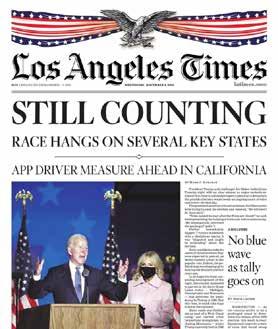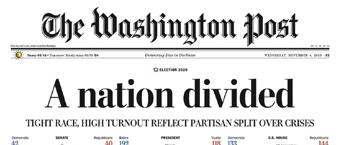
5 minute read
Reading as Critical Thinking
LITERARy LESSONS: Reading as Critical Thinking and Catharsis
By Lisa Ann Villarreal, Ph.D.
On the afternoon of November 4, as we all waited anxiously to learn the results of the previous day’s presidential election, I met with my Modern World Literature class to open our discussion of a new book; that day, we were scheduled to begin studying Cristina Garcia’s Dreaming in Cuban, a 1992 novel that showcases the multigenerational connections and conflicts in a Cuban family. The course curriculum was designed around four novels by women of color from across the globe. Most of these I had chosen because they engaged directly with contemporary issues that touched my students’ lives; Dreaming in Cuban, a thirty-year-old book about communist Cuba, seemed less topical by comparison, but I thought my students would enjoy reading it. I could never have anticipated how this story would reflect our own experiences and emotions on that November day. The primary conflict of the novel is the estrangement between the matriarch Celia del Pino and her middle-aged daughter Lourdes. Celia is a devotee of Castro and a fervent supporter of the revolution, while Lourdes, an expatriate who started a successful chain of bakeries in New York, is its most bitter critic. Their political differences have driven a wedge between mother and daughter, forcing the rest of the family to choose sides. As my student Alan Arreola ’24 characterized it, “Dreaming in Cuban paints a conflict between family and their values that diminishes their ability to achieve closeness with each other.” As we began our discussion, it quickly became clear that, in the wake of the election, my students had been coping with similar conflicts. Melissa Herrera ’22 commented, “It’s heartbreaking to see people who I thought were my friends vote for someone to take away family rights. And then they still expect to stay friends.”



“It was really eye-opening to see my friends and people I’m close to – the views that came out of them, and who they voted for. I don’t look at them the same way,” echoed Spencer Pahlavan ’23. Life imitating art, many of my students had found themselves, like the characters in our novel, torn between the love that they felt for friends or family and the discomfort, even disgust, evoked by the views they heard espoused. And like the del Pinos, they struggled to find a way to preserve their relationships in the face of those differences, and wondered whether it’s truly possible to love someone while hating their beliefs. As Anna Schobel ’21 avowed, “For me, there are issues in politics that are just not negotiable.” Exploring the relationships in the novel, our discussion yielded insights into why political differences are so polarizing, so difficult to talk about, and why they can hurt so much when they pit us against those we care about. Anna pointed out that the political differences between Celia and Lourdes actually represented a deeper incompatibility: “Political opinions are founded on values, and if your values are different from the values of those around you, that is going to cause conflict. And it’s not the kind of conflict you can just look away from. It’s fundamental.” Yaquan ‘Rebecca’ Wang ’21 agreed that this was probably the real reason Celia was so hurt and angered by Lourdes’ emigration. She explained that political differences reflect “opposite ideologies” – fundamental differences in how we see the world – of which “political standing is just the most obvious aspect that you can see. If you have opposite beliefs from your family, this can be very painful. As a teenager, you are dependent on your family, but then you step outside and see a bigger part of the world. Suddenly, your ideology comes not just from your family but from your outside environment. For the elder generation, it might feel like a betrayal.” Days passed, and the election was decided, but the anger and intolerance that had infused so much of the rhetoric surrounding it had done lasting damage to our relationships and our nation. Counting votes and certifying results couldn’t provide a resolution for our deeper concerns about political extremism in this country. And yet, in being able to process this moment with my students through our discussion of Dreaming in Cuban, I found solace and hope. I hope they did, too.
Would you like to discover more works of world literature that carry lessons for our current moment? Read along with our class:
Chimamanda Ngozi Adichie, Americanah
Chimamanda Adichie delves into the experience of Black Americans and the struggle for racial justice in this coming-of-age story of a young Nigerian woman. When Ifemelu moves to Philadelphia for college, she encounters xenophobia and discrimination; searching for acceptance, she is forced not only to reconceptualize her own identity, but to question the basis on which Black women in America define themselves and their allegiances.
Edwidge Danticat, Breath, Eyes, Memory
At the age of twelve, Sophie Caco is uprooted, passed from one family member to another and displaced from her home in Haiti to New York City; there she discovers the terrible truth about her mother’s past and the lasting trauma that haunts the women of her family. Through her story, Haitian author Edwidge Danticat explores issues of race and identity, nationality and immigration, patriarchy and gendered violence.
Arundhati Roy, The God of Small Things
What seem to be small things — white lies, thoughtless words spoken in anger, capricious decisions, minor humiliations — can have dramatic, even tragic consequences, when they collide with the forces of tribalism, systemic discrimination, and political turmoil. The God of Small Things tells the story of two children who, through a series of minor accidents and mistakes, find themselves embroiled in the public upheaval erupting from caste and class conflict in their southern Indian town. Arundhati Roy examines the legacy of colonialism and the harsh realities of caste discrimination in India, explicitly engaging with the trauma of police violence against minorities. But she also reminds us of the possibility of finding comfort, even joy, in the small things, even when surrounded by consuming darkness.










